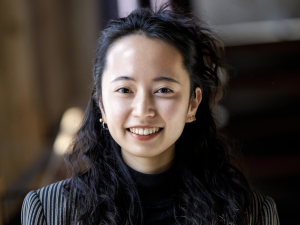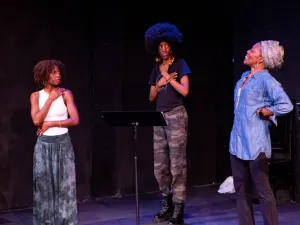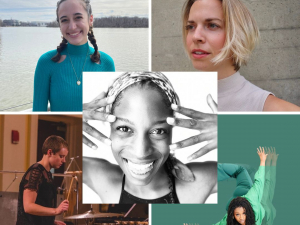The Master of Fine Arts in Dance: Embodied Interdisciplinary Praxis (MFAEIP) is a two-year, full-time, terminal degree program grounded in Duke’s interdisciplinary approach. We encourage research that responds to urgent global issues and joins critical conversations both within and beyond the arts.
In addition to undertaking advanced study in movement traditions and choreographic practices, MFAEIP students are required to pursue substantial study --five graduate courses—in disciplines outside of dance. MFAEIP students design research projects in collaboration with dance and non-dance faculty and often stage thesis actions in collaboration with Duke’s research centers, institutes, and community partner organizations.
MFAEIP students can choose to pursue additional graduate certificates in African and African American Studies, Innovation & Entrepreneurship, or College Teaching during their four semesters in the program.
During the summer of year one, MFAEIP students hone creative strategies and refine their thesis proposals alongside acclaimed guest artists through the MFAEIP Summer Hothouse, an arts research incubator curated and sponsored by the Duke Dance Program in collaboration with the American Dance Festival.
Program Strength
Duke Dance faculty help students locate an approach to dance-making that is uniquely linked to their history, values, and the communities to which they belong. We strongly affirm dance as a vital form of human expression and knowledge production and encourage students to design artistic interventions that both name and enact the changes that they hope to see in the world. Duke’s highly tailored MFA curriculum prepares students for the ongoing challenge of translating dance’s value to diverse publics. Our core courses uphold the rigors of Duke as an elite research university and require students to actively apply their questions about power and embodiment to larger social questions in the arts and allied fields.
Allied research pathways pursued by graduate dance students include (but are not limited to): gender studies, African and African American studies, Asian and Middle Eastern studies, religious studies, cultural anthropology, neuroscience, health/medical humanities, and experimental documentary and cinematic arts.
Graduate artistic experimentation takes place inside Duke’s legacy dance research home, the Ark, and within our state-of-the-art facilities at the Rubenstein Arts Center (est. 2018). Beyond these officially “dance-designated” venues, MFAEIP artists are highly encouraged to produce performance interventions in unlikely campus venues or entirely off site.
With close attention from faculty, students depart the MFAEIP program with honed choreographic methodologies, a powerful capacity in movement and verbal articulation to defend dance as vital embodied knowledge across a range of contexts, an expanded network of mentors and supporters, and a lifelong invitation to return to Duke, specifically to the MFAEIP Summer Hothouse to continue their creative flourishing.
For Prospective Students
Prospective students apply to the MFAEIP with a research proposal that evidences their interest in experimenting with interdisciplinary approaches to dance and performance at Duke.
Prospective students are encouraged to share with us information about themselves by signing up for our mailing list, filling out the online form below, and attending upcoming virtual information sessions listed on the Duke Dance Program website.











